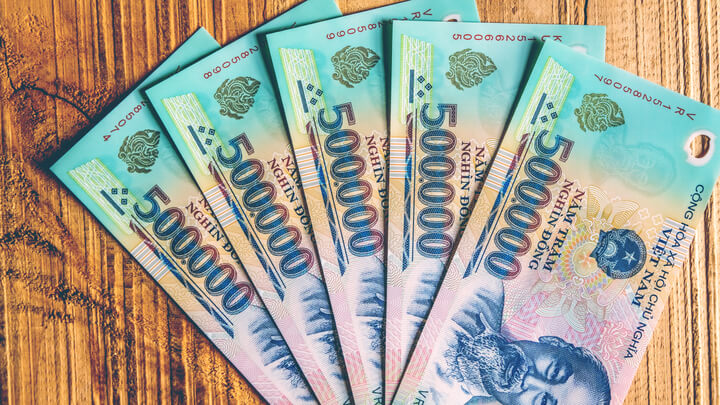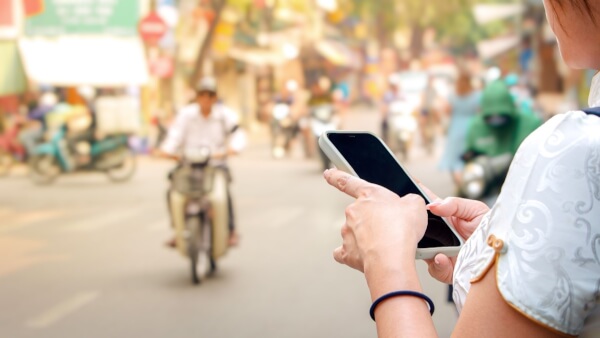How to buy a prepaid SIM card for Vietnam?
Check out our in-depth guide on everything you need to know about buying a prepaid Vietnam SIM card, including different providers, pricing, and features.

The first six months of 2016 saw over 4.7 million foreign visitors arriving in Vietnam - an impressive 21% increase on the previous year. If you’re planning a visit to Vietnam’s vibrant and welcoming shores, then you will need some cash in your pocket to enjoy it.
This guide gives you the lowdown on currency in Vietnam, where to get it - and how to spend it. With details of how to find an ATM, which banks you can expect to see, and how to get the best currency exchange rates, we’ve done the hard work so you don't have to. Enjoy.
The official currency in Vietnam is Dong (VND). Although there are some coins in circulation, the vast majority of currency is paper, and some traders will not accept coins at all.
Notes start from 200 VDN (which equates to a tiny 0.0089 USD). They then run upwards with additional denominations of 500, 1.000, 2.000, 5.000, 10.000, 20.000, 50.000, 100.000, 200.000 and 500.000. At today’s rates, a 500000 VND note will set you back only 22.4 USD (making you a Dong millionaire for under $45).
Although it's illegal to advertise prices, or ask for payment in currency other than VND, you will find that foreign currency is widely accepted. Crisp, clean dollar bills are a favourite - but the exchange rates imposed are selected by the vendor and will not be the most favourable around. Make sure you check before agreeing to pay in a foreign currency.
Although some larger currency exchange services in Europe and the USA will offer VND, it is usually possible to get a better rate if you exchange your cash on arrival.
Cash - particularly USD, GBP or Euro - is easily exchanged, as long as the notes you present are clean. Many exchange services will not accept bank notes if they have writing on them, are crumpled or in any way damaged.
If you need currency upon arrival, you can change a small amount at the airport - although the rates on offer are unlikely to be the best in town. You should also watch out for hidden fees. Even if an exchange claims ‘Zero Commission’, they will simply wrap up their profit into the headline rate on offer.
It is usually best to switch only a small amount, and then seek a better deal elsewhere. Otherwise, consider using an ATM to withdraw VND directly at a reasonable rate.
Once you arrive at your destination, and before you choose a currency exchange service, make sure you understand the mid market rate. This is the only real exchange rate, and should be used to compare the tourist rates on offer. Find out the mid market rate by using a currency converter so you know whether or not a deal is fair.
It is very likely that hotel exchange rates will be poor and include high fees. It is likely that you will get a better deal using your credit or debit card at an ATM (more details below).
A common scam when exchanging currency or paying for goods, is to hand over an incorrect amount of VND by a factor of ten, as foreigners tend to be dazzled by the large numbers of notes. So for example, you might be given five 2000VND notes in exchange for one 100000 note. Watch out.
It can be tricky to find places to exchange Traveller’s Cheques in Vietnam. Although some banks will do it, branches might be closed at weekends, leaving you short.
If you have Traveller’s Cheques to exchange then try a Tourist Office, who will be able to advise and might be able to exchange them directly for you. However, as the rates tend not to be favourable, exchanging cash or using an ATM is usually a better plan.
You will find that most major credit cards are accepted in Vietnam, especially in the cities and tourist areas. However, retailers will add a commission, with 3% as a standard, and 4% for Amex transactions. Having a Credit Card for use in emergencies is certainly an attractive option, but make sure you tell your bank you plan on travelling so they do not suspect suspicious activity and block your card.
If you choose to spend on a Credit or Debit Card, you might be asked if you want to be charged in your home currency. This is something called Dynamic Currency Conversion (DCC). With DCC you can choose to see the cost of the transaction expressed in your home currency at the point of payment. However, this leaves you exposed to hidden fees, as the base rate used will not be favourable, and additional charges can be rolled into the headline number too. Always opt to pay in the local currency instead.
Carry some local cash at all times, in case you are unable to pay by card. Or if you get stuck, use one of the ATM locators below to find a nearby bank machine, and withdraw some cash directly.
ATMs are commonly available in cities and tourist areas, but fees will be applied, and maximum withdrawal rates are very low. Although you can simply put your card back into the machine to take out more, you will still be subject to your home bank’s daily limits.
To find ATMs near you, try one of these global ATM locators:
Some ATMs do not tell you the fee charged when withdrawing cash - you will simply see a message saying ‘Fees will be applied’. If you have the option, avoid these and look for a bank that is transparent about their charges. At the time of writing, MB Bank is reported to be the fairest for foreign card users - but fees may change over time, so check before you withdraw.
As a result of DCC (described above), you might be asked if you would like to be charged for the withdrawal in your home currency. Always select to be charged in local currency, for the best deal when withdrawing money. By doing this, your home bank will assign you an exchange rate, which will usually be more favourable than the rate used by the ATM.
If you’re planning a trip to Vietnam it is worth talking to your local bank to see if they have any partnerships with banks operating in Vietnam. If they do, you may be able to use certain ATMs for reduced fees.
Vietinbank Vietinbank (Vietnam Joint Stock Commercial Bank for Industry and Trade) is the largest bank in Vietnam. It is state owned but has joint partnerships with various other institutions.
Next largest is the Joint Stock Commercial Bank for Foreign Trade of Vietnam, more snappily known as Vietcombank. Both have an extensive branch and ATM network across major towns and cities.
Below are the most common retail banks in Vietnam. Alternatively, check out this list of some of the foreign banks with branches in Vietnam:
| Vietnamese Retail Banks | Foreign Banks |
|---|---|
| Vietinbank | Deutsche Bank |
| Vietcombank | ANZ |
| Vietnam Bank for Agriculture | HSBC |
| Housing Bank of Mekong Delta | Citibank |
| Orient Commercial Joint Stock Ban | Bangkok Bank |
For simple access to your money abroad - and an even better deal - use Transferwise.
If you have a bank account in Vietnam, or know someone who does, you can transfer money between accounts using the real mid market exchange rate. It's a quick and convenient way to get your cash, with no hidden fees.
*Please see terms of use and product availability for your region or visit Wise fees and pricing for the most up to date pricing and fee information.
This publication is provided for general information purposes and does not constitute legal, tax or other professional advice from Wise Payments Limited or its subsidiaries and its affiliates, and it is not intended as a substitute for obtaining advice from a financial advisor or any other professional.
We make no representations, warranties or guarantees, whether expressed or implied, that the content in the publication is accurate, complete or up to date.

Check out our in-depth guide on everything you need to know about buying a prepaid Vietnam SIM card, including different providers, pricing, and features.

Should you pay with cash or card in Vietnam? A handy guide including cash etiquette, Vietnamese ATMs and using your UK card.

Vietnam is a beautifully tropical country filled with some of the warmest and friendliest people you’ll ever meet. From the chaotic streets of Hanoi to the...

Read our essential guide to ATMs in Vietnam, including how to find them, fees, exchange rates, withdrawal limits and more.